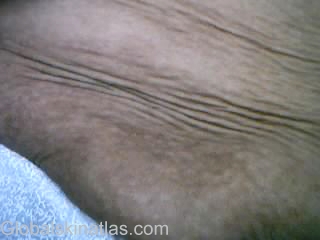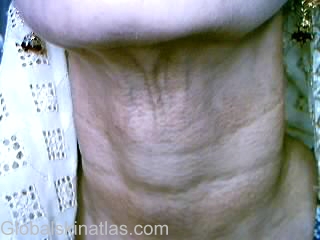

Diagnosis: Pseudoxanthoma elasticum
Description: Wrinkling, mottling and sagging of abdominal skin
Morphology: Papules,yellow
Site: Abdomen
Sex: F
Age: 37
Type: Clinical
Submitted By: Irfan Bari
Differential DiagnosisHistory: Pseudoxanthoma elasticum (PXE) is a classic inherited disorder of the elastic tissue characterized by progressive calcification of elastic fibers with a pathognomonic histological appearance. The clinical manifestations of PXE typically involve the skin, the eye and the cardiovascular system, resulting in skin lesions, decreased vision and vascular disease. Most patients are sporadic cases. The majority of familial cases show autosomal recessive (AR) inheritance, but autosomal dominant (AD) inheritance has also been reported. Recently, underlying genetic defects have been identified in the ABCC6 gene. Typical cutaneous lesions are described as yellow waxy papules associated with loose and thickened skin, distributed in the intertriginous areas of the body, such as the flexural regions of the extremities, in the folds of the skin at the sides of the neck, the cubital and popliteal fossa, the axilla, in the creases of the groin, and periumbilical area. Other systemic findings include intracranial aneurysms, claudication, hypertension, cerebrovascular accidents, cerebral ischemia, myocardial infarction, and GI hemorrhage. Histopathological changes consist of fragmented, swollen, and clumped elastic fibers, which may be calcified in the deeper layers of the dermis.

